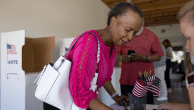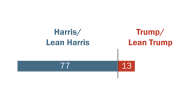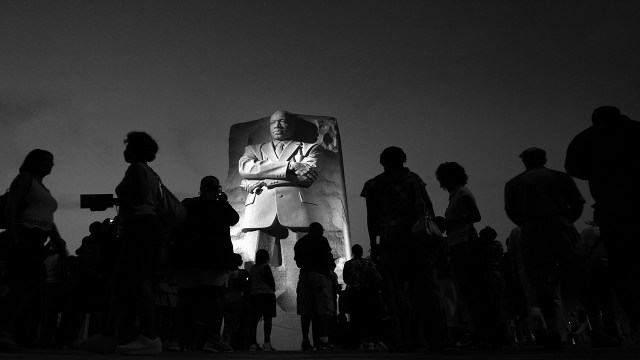
Pew Research Center conducted this analysis to understand the nuances among Black people on issues of racial inequality and social change in the United States. This in-depth survey explores differences among Black Americans in their views on the social status of the Black population in the U.S.; their assessments of racial inequality; their visions for institutional and social change; and their outlook on the chances that these improvements will be made. The analysis is the latest in the Center’s series of in-depth surveys of public opinion among Black Americans (read the first, “Faith Among Black Americans” and “Race Is Central to Identity for Black Americans and Affects How They Connect With Each Other”).
The online survey of 3,912 Black U.S. adults was conducted Oct. 4-17, 2021. Black U.S. adults include those who are single-race, non-Hispanic Black Americans; multiracial non-Hispanic Black Americans; and adults who indicate they are Black and Hispanic. The survey includes 1,025 Black adults on Pew Research Center’s American Trends Panel (ATP) and 2,887 Black adults on Ipsos’ KnowledgePanel. Respondents on both panels are recruited through national, random sampling of residential addresses.
Recruiting panelists by phone or mail ensures that nearly all U.S. Black adults have a chance of selection. This gives us confidence that any sample can represent the whole population (see our Methods 101 explainer on random sampling). Here are the questions used for the survey of Black adults, along with its responses and methodology.
The terms “Black Americans,” “Black people” and “Black adults” are used interchangeably throughout this report to refer to U.S. adults who self-identify as Black, either alone or in combination with other races or Hispanic identity.
Throughout this report, “Black, non-Hispanic” respondents are those who identify as single-race Black and say they have no Hispanic background. “Black Hispanic” respondents are those who identify as Black and say they have Hispanic background. We use the terms “Black Hispanic” and “Hispanic Black” interchangeably. “Multiracial” respondents are those who indicate two or more racial backgrounds (one of which is Black) and say they are not Hispanic.
Respondents were asked a question about how important being Black was to how they think about themselves. In this report, we use the term “being Black” when referencing responses to this question.
In this report, “immigrant” refers to people who were not U.S. citizens at birth – in other words, those born outside the U.S., Puerto Rico or other U.S. territories to parents who were not U.S. citizens. We use the terms “immigrant,” “born abroad” and “foreign-born” interchangeably.
Throughout this report, “Democrats and Democratic leaners” and just “Democrats” both refer to respondents who identify politically with the Democratic Party or who are independent or some other party but lean toward the Democratic Party. “Republicans and Republican leaners” and just “Republicans” both refer to respondents who identify politically with the Republican Party or are independent or some other party but lean toward the Republican Party.
Respondents were asked a question about their voter registration status. In this report, respondents are considered registered to vote if they self-report being absolutely certain they are registered at their current address. Respondents are considered not registered to vote if they report not being registered or express uncertainty about their registration.
To create the upper-, middle- and lower-income tiers, respondents’ 2020 family incomes were adjusted for differences in purchasing power by geographic region and household size. Respondents were then placed into income tiers: “Middle income” is defined as two-thirds to double the median annual income for the entire survey sample. “Lower income” falls below that range, and “upper income” lies above it. For more information about how the income tiers were created, read the methodology.
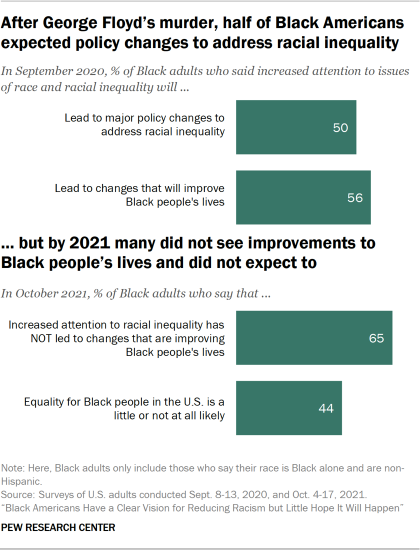
More than a year after the murder of George Floyd and the national protests, debate and political promises that ensued, 65% of Black Americans say the increased national attention on racial inequality has not led to changes that improved their lives.1 And 44% say equality for Black people in the United States is not likely to be achieved, according to newly released findings from an October 2021 survey of Black Americans by Pew Research Center.
This is somewhat of a reversal in views from September 2020, when half of Black adults said the increased national focus on issues of race would lead to major policy changes to address racial inequality in the country and 56% expected changes that would make their lives better.
At the same time, many Black Americans are concerned about racial discrimination and its impact. Roughly eight-in-ten say they have personally experienced discrimination because of their race or ethnicity (79%), and most also say discrimination is the main reason many Black people cannot get ahead (68%).
Even so, Black Americans have a clear vision for how to achieve change when it comes to racial inequality. This includes support for significant reforms to or complete overhauls of several U.S. institutions to ensure fair treatment, particularly the criminal justice system; political engagement, primarily in the form of voting; support for Black businesses to advance Black communities; and reparations in the forms of educational, business and homeownership assistance. Yet alongside their assessments of inequality and ideas about progress exists pessimism about whether U.S. society and its institutions will change in ways that would reduce racism.
These findings emerge from an extensive Pew Research Center survey of 3,912 Black Americans conducted online Oct. 4-17, 2021. The survey explores how Black Americans assess their position in U.S. society and their ideas about social change. Overall, Black Americans are clear on what they think the problems are facing the country and how to remedy them. However, they are skeptical that meaningful changes will take place in their lifetime.
Black Americans see racism in our laws as a big problem and discrimination as a roadblock to progress
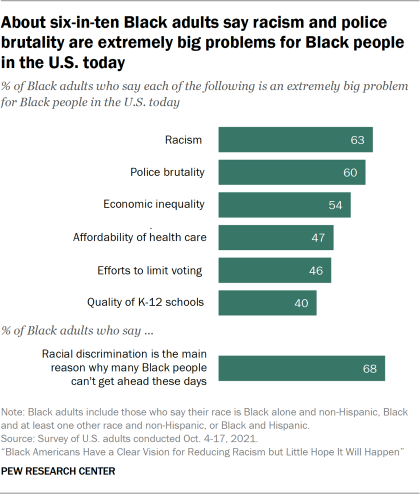
Black adults were asked in the survey to assess the current nature of racism in the United States and whether structural or individual sources of this racism are a bigger problem for Black people. About half of Black adults (52%) say racism in our laws is a bigger problem than racism by individual people, while four-in-ten (43%) say acts of racism committed by individual people is the bigger problem. Only 3% of Black adults say that Black people do not experience discrimination in the U.S. today.
In assessing the magnitude of problems that they face, the majority of Black Americans say racism (63%), police brutality (60%) and economic inequality (54%) are extremely or very big problems for Black people living in the U.S. Slightly smaller shares say the same about the affordability of health care (47%), limitations on voting (46%), and the quality of K-12 schools (40%).
Aside from their critiques of U.S. institutions, Black adults also feel the impact of racial inequality personally. Most Black adults say they occasionally or frequently experience unfair treatment because of their race or ethnicity (79%), and two-thirds (68%) cite racial discrimination as the main reason many Black people cannot get ahead today.
Black Americans’ views on reducing racial inequality
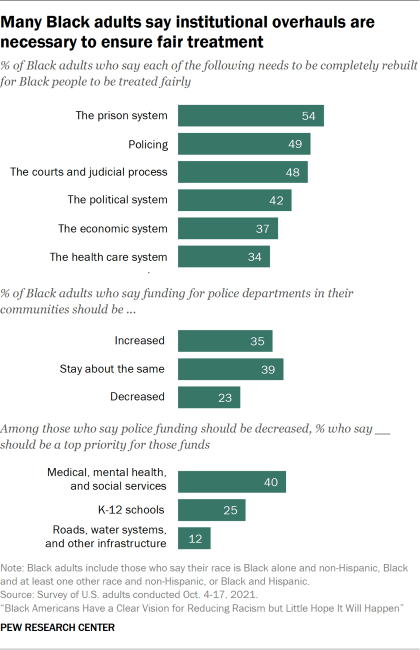
Black Americans are clear on the challenges they face because of racism. They are also clear on the solutions. These range from overhauls of policing practices and the criminal justice system to civic engagement and reparations to descendants of people enslaved in the United States.
Changing U.S. institutions such as policing, courts and prison systems
About nine-in-ten Black adults say multiple aspects of the criminal justice system need some kind of change (minor, major or a complete overhaul) to ensure fair treatment, with nearly all saying so about policing (95%), the courts and judicial process (95%), and the prison system (94%).
Roughly half of Black adults say policing (49%), the courts and judicial process (48%), and the prison system (54%) need to be completely rebuilt for Black people to be treated fairly. Smaller shares say the same about the political system (42%), the economic system (37%) and the health care system (34%), according to the October survey.
While Black Americans are in favor of significant changes to policing, most want spending on police departments in their communities to stay the same (39%) or increase (35%). A little more than one-in-five (23%) think spending on police departments in their area should be decreased.
Black adults who favor decreases in police spending are most likely to name medical, mental health and social services (40%) as the top priority for those reappropriated funds. Smaller shares say K-12 schools (25%), roads, water systems and other infrastructure (12%), and reducing taxes (13%) should be the top priority.
Voting and ‘buying Black’ viewed as important strategies for Black community advancement
Black Americans also have clear views on the types of political and civic engagement they believe will move Black communities forward. About six-in-ten Black adults say voting (63%) and supporting Black businesses or “buying Black” (58%) are extremely or very effective strategies for moving Black people toward equality in the U.S. Smaller though still significant shares say the same about volunteering with organizations dedicated to Black equality (48%), protesting (42%) and contacting elected officials (40%).
Black adults were also asked about the effectiveness of Black economic and political independence in moving them toward equality. About four-in-ten (39%) say Black ownership of all businesses in Black neighborhoods would be an extremely or very effective strategy for moving toward racial equality, while roughly three-in-ten (31%) say the same about establishing a national Black political party. And about a quarter of Black adults (27%) say having Black neighborhoods governed entirely by Black elected officials would be extremely or very effective in moving Black people toward equality.
Most Black Americans support repayment for slavery
Discussions about atonement for slavery predate the founding of the United States. As early as 1672, Quaker abolitionists advocated for enslaved people to be paid for their labor once they were free. And in recent years, some U.S. cities and institutions have implemented reparations policies to do just that.
Most Black Americans say the legacy of slavery affects the position of Black people in the U.S. either a great deal (55%) or a fair amount (30%), according to the survey. And roughly three-quarters (77%) say descendants of people enslaved in the U.S. should be repaid in some way.
Black adults who say descendants of the enslaved should be repaid support doing so in different ways. About eight-in-ten say repayment in the forms of educational scholarships (80%), financial assistance for starting or improving a business (77%), and financial assistance for buying or remodeling a home (76%) would be extremely or very helpful. A slightly smaller share (69%) say cash payments would be extremely or very helpful forms of repayment for the descendants of enslaved people.
Where the responsibility for repayment lies is also clear for Black Americans. Among those who say the descendants of enslaved people should be repaid, 81% say the U.S. federal government should have all or most of the responsibility for repayment. About three-quarters (76%) say businesses and banks that profited from slavery should bear all or most of the responsibility for repayment. And roughly six-in-ten say the same about colleges and universities that benefited from slavery (63%) and descendants of families who engaged in the slave trade (60%).
Black Americans are skeptical change will happen
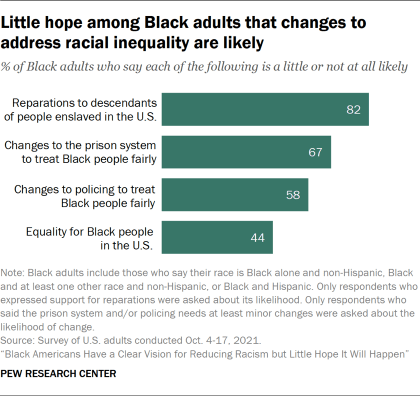
Even though Black Americans’ visions for social change are clear, very few expect them to be implemented. Overall, 44% of Black adults say equality for Black people in the U.S. is a little or not at all likely. A little over a third (38%) say it is somewhat likely and only 13% say it is extremely or very likely.
They also do not think specific institutions will change. Two-thirds of Black adults say changes to the prison system (67%) and the courts and judicial process (65%) that would ensure fair treatment for Black people are a little or not at all likely in their lifetime. About six-in-ten (58%) say the same about policing. Only about one-in-ten say changes to policing (13%), the courts and judicial process (12%), and the prison system (11%) are extremely or very likely.
This pessimism is not only about the criminal justice system. The majority of Black adults say the political (63%), economic (62%) and health care (51%) systems are also unlikely to change in their lifetime.
Black Americans’ vision for social change includes reparations. However, much like their pessimism about institutional change, very few think they will see reparations in their lifetime. Among Black adults who say the descendants of people enslaved in the U.S. should be repaid, 82% say reparations for slavery are unlikely to occur in their lifetime. About one-in-ten (11%) say repayment is somewhat likely, while only 7% say repayment is extremely or very likely to happen in their lifetime.
Black Democrats, Republicans differ on assessments of inequality and visions for social change
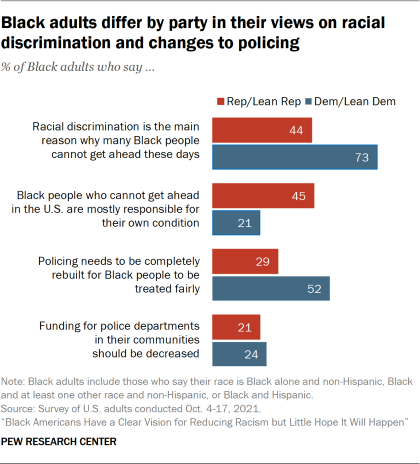
Party affiliation is one key point of difference among Black Americans in their assessments of racial inequality and their visions for social change. Black Republicans and Republican leaners are more likely than Black Democrats and Democratic leaners to focus on the acts of individuals. For example, when summarizing the nature of racism against Black people in the U.S., the majority of Black Republicans (59%) say racist acts committed by individual people is a bigger problem for Black people than racism in our laws. Black Democrats (41%) are less likely to hold this view.
Black Republicans (45%) are also more likely than Black Democrats (21%) to say that Black people who cannot get ahead in the U.S. are mostly responsible for their own condition. And while similar shares of Black Republicans (79%) and Democrats (80%) say they experience racial discrimination on a regular basis, Republicans (64%) are more likely than Democrats (36%) to say that most Black people who want to get ahead can make it if they are willing to work hard.
On the other hand, Black Democrats are more likely than Black Republicans to focus on the impact that racial inequality has on Black Americans. Seven-in-ten Black Democrats (73%) say racial discrimination is the main reason many Black people cannot get ahead in the U.S, while about four-in-ten Black Republicans (44%) say the same. And Black Democrats are more likely than Black Republicans to say racism (67% vs. 46%) and police brutality (65% vs. 44%) are extremely big problems for Black people today.
Black Democrats are also more critical of U.S. institutions than Black Republicans are. For example, Black Democrats are more likely than Black Republicans to say the prison system (57% vs. 35%), policing (52% vs. 29%) and the courts and judicial process (50% vs. 35%) should be completely rebuilt for Black people to be treated fairly.
While the share of Black Democrats who want to see large-scale changes to the criminal justice system exceeds that of Black Republicans, they share similar views on police funding. Four-in-ten each of Black Democrats and Black Republicans say funding for police departments in their communities should remain the same, while around a third of each partisan coalition (36% and 37%, respectively) says funding should increase. Only about one-in-four Black Democrats (24%) and one-in-five Black Republicans (21%) say funding for police departments in their communities should decrease.
Among the survey’s other findings:
Black adults differ by age in their views on political strategies. Black adults ages 65 and older (77%) are most likely to say voting is an extremely or very effective strategy for moving Black people toward equality. They are significantly more likely than Black adults ages 18 to 29 (48%) and 30 to 49 (60%) to say this. Black adults 65 and older (48%) are also more likely than those ages 30 to 49 (38%) and 50 to 64 (42%) to say protesting is an extremely or very effective strategy. Roughly four-in-ten Black adults ages 18 to 29 say this (44%).
Gender plays a role in how Black adults view policing. Though majorities of Black women (65%) and men (56%) say police brutality is an extremely big problem for Black people living in the U.S. today, Black women are more likely than Black men to hold this view. When it comes to criminal justice, Black women (56%) and men (51%) are about equally likely to share the view that the prison system should be completely rebuilt to ensure fair treatment of Black people. However, Black women (52%) are slightly more likely than Black men (45%) to say this about policing. On the matter of police funding, Black women (39%) are slightly more likely than Black men (31%) to say police funding in their communities should be increased. On the other hand, Black men are more likely than Black women to prefer that funding stay the same (44% vs. 36%). Smaller shares of both Black men (23%) and women (22%) would like to see police funding decreased.
Income impacts Black adults’ views on reparations. Roughly eight-in-ten Black adults with lower (78%), middle (77%) and upper incomes (79%) say the descendants of people enslaved in the U.S. should receive reparations. Among those who support reparations, Black adults with upper and middle incomes (both 84%) are more likely than those with lower incomes (75%) to say educational scholarships would be an extremely or very helpful form of repayment. However, of those who support reparations, Black adults with lower (72%) and middle incomes (68%) are more likely than those with higher incomes (57%) to say cash payments would be an extremely or very helpful form of repayment for slavery.



